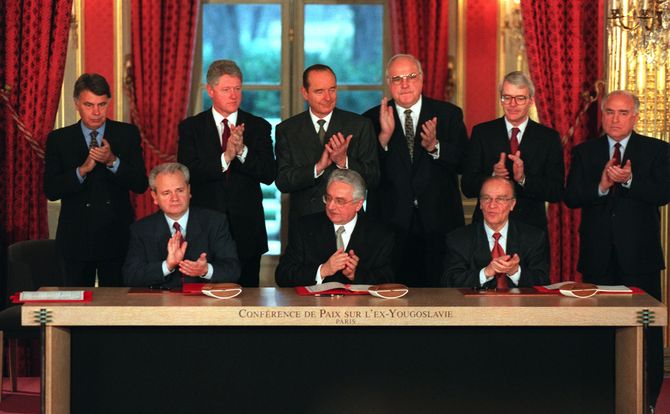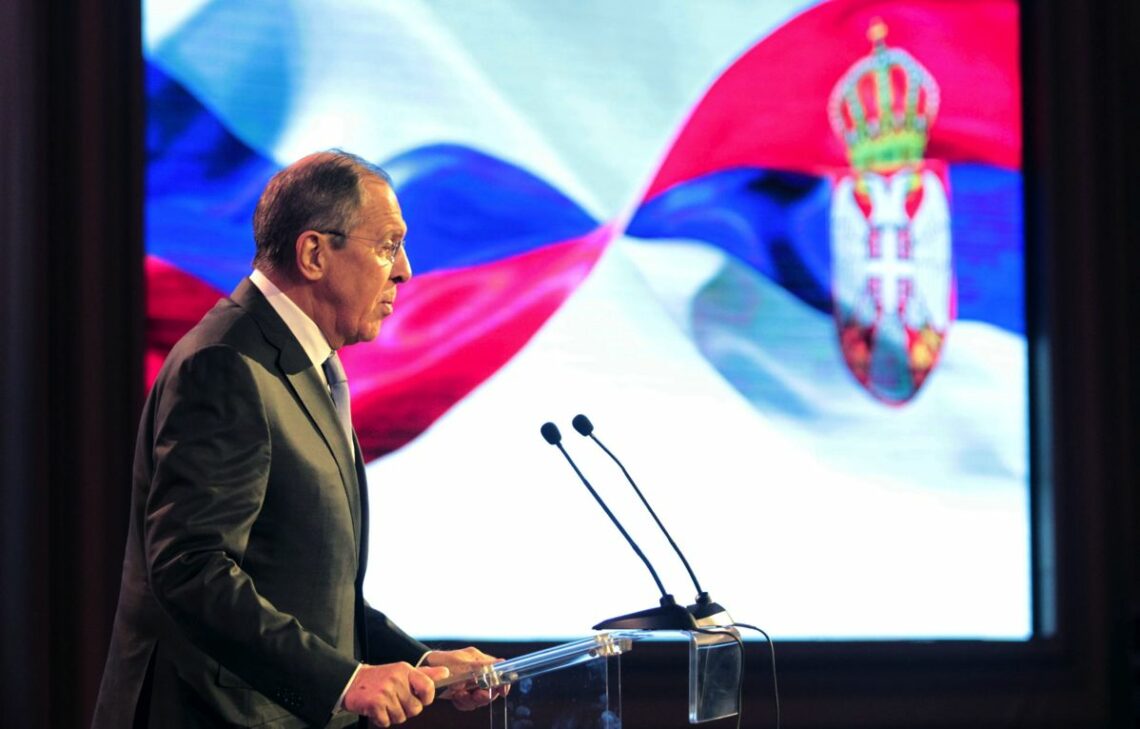A sad centennial: Unfinished peace in the Balkans
The approaching anniversary of the end of World War I is a reminder that the place where that conflict started, the Western Balkans, has still not achieved a lasting peace.

In a nutshell
- International monitoring and development aid have helped keep peace in the Balkans
- However, the structural steps needed to reconcile former enemies have not been taken
- The stalled transition has allowed corruption and mafia-like power structures to flourish
- Strong U.S. commitment is needed to draw the whole region into the Western orbit
Nearly a hundred years after the end of World War I, the Western Balkans find themselves coping with another botched peace settlement. Europe’s most troubled region is stuck in an incomplete transition from the post-Yugoslav Wars to functioning democracies. There has been no real reconciliation, no agreement on war reparations, and no equitable distribution of Yugoslav assets to the successor states. Tying up these loose ends could take another two decades, if it is done at all.
Real reconciliation is still in its initial phase. The European Union, through its Stabilisation and Association Process (SAP) launched in 1999, tried to draw former wartime enemies into a regional framework to prepare for possible accession. With the adoption of its EU-Western Balkans Strategy in February 2018, the European Commission made clear that there will be no accession of new members without resolving their mutual differences.
The two toughest challenges over the next few years will be sorting out the Serbia-Kosovo and Serbia-Croatia disputes. The first is still being mediated under the EU-facilitated “Brussels Dialogue,” but no quick breakthroughs (via mutual recognition of borders or a territorial swap) can be expected. The Croatia-Serbia case is different, since both countries recognize each other and maintain diplomatic relations. Yet building a “normal” relationship between the two neighbors might take at least another decade.
Reaching accords on war reparations among the former enemies – and now candidates for EU membership – are also still pending. Besides individual cases at the International Criminal Tribunal for the former Yugoslavia (ICTY), no prosecutions for genocide have been initiated and no reliable, independent estimates of war damage have been compiled.
Division of the former Yugoslavia’s state assets has also dragged on for 15 years with no clear-cut result. The bulk of this property now belongs to Serbia – a situation that has been contested by the other former federal constituents, who are asking for a more equal distribution.
Neither war nor democracy
The Western Balkans can be expected to remain under vigorous monitoring by the international community over the next decade. This arrangement is meant to preserve the peace, but is not likely to remove some of the main sources of tension. More and more, these can be found in the region’s young democracies, whose failures could keep the area as a crisis zone in the future.
In the aftermath of World War I, liberal theorists sought to trace responsibility for the war to the prevalence of undemocratic regimes in the prewar period. However, the past quarter-century in the Balkans shows that democracy does not necessarily foster peace. Instead, armed conflict has been avoided by a combination of international supervision, regional programs to promote economic development, and entrenched political leaderships that provide stability but also allow corruption and mafia-like power structures to flourish. Until the latter problem is recognized and dealt with, the Western Balkans will find it difficult to achieve democratic governance or a sustainable peace.
The postwar Balkans model is a classic short-term strategy that has not resolved the underlying structural problems.
The region still seems not to have absorbed the historical lessons of the post-World War I settlement. Its dominant post-communist ideology remains nationalism, often in its corrupt, client-state variant. As opium for the masses, “big national ideas” are fed to the citizens, who are warned against traditional national enemies. Having thus diverted the voters, corrupt politicians can continue to siphon national budgets undisturbed. Nationalist thinking has not resolved a single outstanding political issue in the Balkans, but has been very good at padding politicians’ bank accounts.
The postwar Balkans model has proved effective at preserving a precarious peace, but has not resolved the underlying structural problems of the postwar period. It is a classic short-term strategy. By tolerating rule by local political bosses who manipulate a nationalist agenda to stay in power, it keeps feelings in the entire region raw. These simmering animosities could flare up over the next decade into a battle of every nation for itself.
The state of permanent bilateral and regional tensions encouraged by Balkan leaders breeds not just domestic but also international crime, including transnational smuggling of contraband and migrants. Clashing oligarchic interests could also lead to new trade wars in the region. The Western Balkans countries are part of Central European Free Trade Agreement (CEFTA), but membership has not ended their bilateral trade and customs disputes. Recent examples include a “potato war” between Albania and Kosovo, and the recent escalation of a “flour war” between Serbia and Macedonia.
Versailles and Dayton
The former Yugoslavia, a state created by the Treaty of Versailles in 1919, was ended by another peace treaty, the Dayton Agreement, in 1995. The latter brought symbolic closure to Europe’s 20th-century wars, which started and ended in the Balkans. The Bosnian capital of Sarajevo provided the spark that set off World War I, and the same city supplied casus belli for Europe’s most dangerous armed conflict after World War II.
The First World War marked the emergence of the United States as a great power and allowed President Woodrow Wilson to act as a peacemaker, expounding his progressive views on an international stage. The Balkan Wars forced the U.S. under President Bill Clinton to step in as an honest broker after Europe failed to stop the slaughter. Both treaties were signed in Paris, but only after active and serious American engagement.
For reconciliation to work, the question of reparations must first be addressed.
Of the former components of Yugoslavia, both Croatia and Slovenia have adopted a clear Western geostrategic orientation. Serbia, on the other hand, remains Russia’s strongest ally in the region, and is still outside of the EU and NATO. In March, Serbia’s parliament began the ratification of a joint security agreement with Russia, which provides for closer cooperation on internal and cybersecurity.
Roadblocks
A century after Versailles, it is remarkable how little the political mentality of the Western Balkans has changed. Nationalism is still the driving force, even though the peoples of the region have fallen victim to some of its bloodiest disasters.
This warlike spirit tends to stop reconciliation efforts before they start. But for reconciliation to work, the question of reparations must first be addressed. Paying for war damage is a thorny issue everywhere: Germany and Luxembourg took 45 years to reach an agreement, and members of Poland’s ruling coalition only recently suggested that their country could reopen the reparations issue. Croatia, Kosovo, and Bosnia and Herzegovina have all said that Serbia must pay – raising the possibility of several bilateral or possibly a single, multilateral agreement on the subject between the Yugoslav successor states.
The “Berlin process,” initiated by German Chancellor Angela Merkel in 2014, attempts to use regional cooperation and infrastructure investments as a way of helping the Balkan countries avoid a repetition of their tragic history. The fifth round of this process will take place in London this July, after the previous four rounds yielded promising but largely symbolic results. In an attempt to break the impasse, the EU has warned that it will not “import” any unresolved territorial disputes of the kind it must deal with on Cyprus, or the border disagreements between Bulgaria and Romania or Slovenia and Croatia.

If reconciliation is to make progress over the next decade, it will probably have to be prodded by the U.S. President Donald Trump’s envoy for the Balkans, Wes Mitchell, clearly announced Washington’s renewed interest in the Balkans during his most recent visit to the region in March.
One reason for the U.S. reengagement is a belated recognition of how deeply Russia has penetrated the region. Mr. Mitchell discussed American proposals for a sustainable peace settlement with political leaders in Serbia and Kosovo; the idea that Serbia should drop its objections to Kosovo’s membership in the United Nations in return for possible membership in the EU was immediately criticized by the Russian Foreign Ministry.
Border adjustments remain on the agenda, including speculation about territorial swaps between Serbia and Kosovo.
Meanwhile, Serbia continues to supply weapons to Republika Srpska, the autonomous ethnic Serb component of Bosnia and Herzegovina, and has concentrated armored units on the border with Kosovo. In March, there was a border violation in northeast Kosovo involving Serbian gendarmes. General Curtis Scaparrotti, the Supreme Allied Commander of NATO forces in Europe, has warned that Russia is using both Serbian states to expand its influence in the Western Balkans and prevent their Euro-Atlantic integration. Asked at a U.S. Senate hearing what aspect of Russian meddling caused the greatest concern in the Balkans, General Scaparrotti had a one-word answer: “Serbia.”
If Serbia’s government balks at a closer alignment with the EU, it could face massive public unrest.
The Serbs remain the region’s strongest military power, with Albania a distant second. Kosovo has no army, but may be forced to create one within the next few years. It is evident that peace in the region will depend above all on Albania and Serbia overcoming their differences, which seems impossible without a stronger American presence. The U.S. is in the process of establishing a military base in Albania to offset Russia’s token military presence in Serbia, and one can expect Washington to apply more robust diplomatic pressure in the Western Balkans in coming years.
Scenarios
The most likely scenario over the next decade is for the EU and the U.S. to continue pursuing their stability-based approach, giving priority to regional security and blocking further Russian penetration. The main focus would be to draw as many countries as possible under the Euro-Atlantic umbrella. This has become even more pertinent after a recent warning by Russian Foreign Minister Sergei Lavrov, who said that by forcing Belgrade to choose between Russia and the West, EU and U.S. policymakers could “step on the same rake as in the Ukrainian crisis, when Ukrainian society was torn apart.” Pressure to leave the Russian orbit will only increase as Serbia enters the final stages of the EU accession process.
The first step for Belgrade would be to recognize Kosovo, or at least drop its objections to Kosovo’s UN membership. The next will be for Serbia to reconsider its close alliance with Russia. If the government balks at a closer alignment with the EU, it could face massive public unrest, and probably a counterreaction from Russia to protect its strongest regional ally. But since Moscow is already suffering from military overstretch in Ukraine and Syria, it may be reluctant to risk a new adventure in the Western Balkans – especially with the U.S. now endorsing Ukraine’s aspirations for NATO membership.
As mentioned earlier, the U.S. can be expected to take a more prominent role in the Western Balkans, stepping in a sense into the EU’s shoes. Washington will certainly not let Russia interfere in how the Balkan countries choose their geopolitical alignments. In pursuing this strategic goal, the U.S. and the EU will follow parallel tracks. Washington will focus on peacekeeping and regional security, while Brussels concentrates on economic development and building democratic institutions.
A second, less likely scenario is that the region will at last turn to democratic state-building after its long postwar transition. Full success is unattainable in the short term, not just because of the structural problems mentioned earlier, but also due to Russia’s strong political, military and energy presence. Recently, Mr. Lavrov has been warning Macedonia about the perils of NATO membership – and this country remains a critical flashpoint. Leaving it outside the Western alliance will only compound the long-term geopolitical risks in the Western Balkans.








